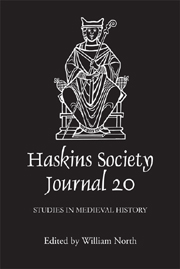Book contents
- Frontmatter
- Contents
- Editor's Note
- Abbreviations
- 1 Buckets, Monasteries, and Crannógs: Material Culture and the Rewriting of Early Medieval British History
- 2 Punishing Bodies and Saving Souls: Capital and Corporal Punishment in Late Anglo-Saxon England
- 3 Writing Latin History for a Lay Audience c. 1000: Dudo of Saint Quentin at the Norman Court
- 4 Between Neighbors and Saints: Waleran I of Meulan and the Allegiance of Lesser Lords in the Eleventh Century
- 5 Who Founded Durtal? Reconsidering the Evidence
- 6 Robert Curthose: Ineffectual Duke or Victim of Spin
- 7 The Chivalric Transformation and the Origins of Tournament as seen through Norman Chroniclers
- 8 An Internal Frontier? The Relationship between Mainland Southern Italy and Sicily in the ‘Norman’ Kingdom
- 9 ‘Hywel in the World’
- 10 Prices, Price Controls, and Market Forces in England under Edward I c. 1294–1307
10 - Prices, Price Controls, and Market Forces in England under Edward I c. 1294–1307
Published online by Cambridge University Press: 12 September 2012
- Frontmatter
- Contents
- Editor's Note
- Abbreviations
- 1 Buckets, Monasteries, and Crannógs: Material Culture and the Rewriting of Early Medieval British History
- 2 Punishing Bodies and Saving Souls: Capital and Corporal Punishment in Late Anglo-Saxon England
- 3 Writing Latin History for a Lay Audience c. 1000: Dudo of Saint Quentin at the Norman Court
- 4 Between Neighbors and Saints: Waleran I of Meulan and the Allegiance of Lesser Lords in the Eleventh Century
- 5 Who Founded Durtal? Reconsidering the Evidence
- 6 Robert Curthose: Ineffectual Duke or Victim of Spin
- 7 The Chivalric Transformation and the Origins of Tournament as seen through Norman Chroniclers
- 8 An Internal Frontier? The Relationship between Mainland Southern Italy and Sicily in the ‘Norman’ Kingdom
- 9 ‘Hywel in the World’
- 10 Prices, Price Controls, and Market Forces in England under Edward I c. 1294–1307
Summary
Historians have long debated whether participation by the ‘state’ in economic affairs in the West was characterized, at the extremes, by the imposition of a kind of ‘command economy’ or rather by its allowance of the free functioning of market forces. Because of the dearth of data that can be analyzed in a statistically significant manner, debates regarding economic affairs in the classical Greek and Roman worlds, Late Antiquity, the Carolingian empire, and its successor states up to Anglo-Norman England have often relied upon scattered pieces of pseudo-statistical information located largely in narrative sources. This rather thin corpus of information has provided considerable scope for the imposition by scholars of models that sustain their preconceived views regarding the organization of economic affairs.
By contrast, the explosion of surviving administrative records in England from the reign of Henry II (1154–1189) onwards permits a far different approach to economic history. Rather than relying primarily on the information provided by laconic narrative sources – Domesday book and the Pipe Roll of 1130 are the major exceptions in the earlier period – scholars have available hundreds of thousands of documents that record the actual participation by the royal government in a very wide range of economic affairs. Documents stored at the National Archives and British Library (including those found in the Liberate Rolls, Pipe Rolls, Patent Rolls, Close Rolls, Wardrobe books, as well as writs, memoranda, letters, inventories, and compoti produced by royal officials) provide detailed and specific information about the prices paid by the kings of England for many different types of items.
- Type
- Chapter
- Information
- The Haskins Society Journal 202008 - Studies in Medieval History, pp. 204 - 220Publisher: Boydell & BrewerPrint publication year: 2009

